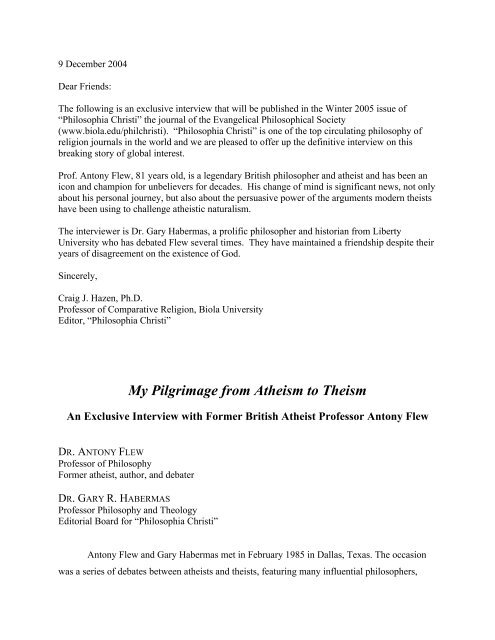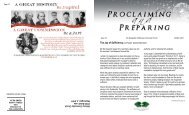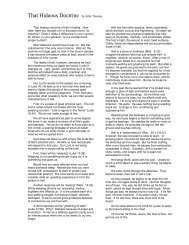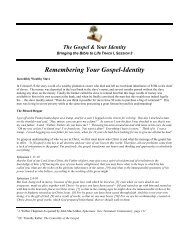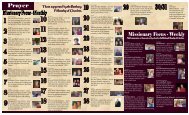My Pilgrimage from Atheism to Theism - World Union of Deists
My Pilgrimage from Atheism to Theism - World Union of Deists
My Pilgrimage from Atheism to Theism - World Union of Deists
Create successful ePaper yourself
Turn your PDF publications into a flip-book with our unique Google optimized e-Paper software.
9 December 2004<br />
Dear Friends:<br />
The following is an exclusive interview that will be published in the Winter 2005 issue <strong>of</strong><br />
“Philosophia Christi” the journal <strong>of</strong> the Evangelical Philosophical Society<br />
(www.biola.edu/philchristi). “Philosophia Christi” is one <strong>of</strong> the <strong>to</strong>p circulating philosophy <strong>of</strong><br />
religion journals in the world and we are pleased <strong>to</strong> <strong>of</strong>fer up the definitive interview on this<br />
breaking s<strong>to</strong>ry <strong>of</strong> global interest.<br />
Pr<strong>of</strong>. An<strong>to</strong>ny Flew, 81 years old, is a legendary British philosopher and atheist and has been an<br />
icon and champion for unbelievers for decades. His change <strong>of</strong> mind is significant news, not only<br />
about his personal journey, but also about the persuasive power <strong>of</strong> the arguments modern theists<br />
have been using <strong>to</strong> challenge atheistic naturalism.<br />
The interviewer is Dr. Gary Habermas, a prolific philosopher and his<strong>to</strong>rian <strong>from</strong> Liberty<br />
University who has debated Flew several times. They have maintained a friendship despite their<br />
years <strong>of</strong> disagreement on the existence <strong>of</strong> God.<br />
Sincerely,<br />
Craig J. Hazen, Ph.D.<br />
Pr<strong>of</strong>essor <strong>of</strong> Comparative Religion, Biola University<br />
Edi<strong>to</strong>r, “Philosophia Christi”<br />
<strong>My</strong> <strong>Pilgrimage</strong> <strong>from</strong> <strong>Atheism</strong> <strong>to</strong> <strong>Theism</strong><br />
An Exclusive Interview with Former British Atheist Pr<strong>of</strong>essor An<strong>to</strong>ny Flew<br />
DR. ANTONY FLEW<br />
Pr<strong>of</strong>essor <strong>of</strong> Philosophy<br />
Former atheist, author, and debater<br />
DR. GARY R. HABERMAS<br />
Pr<strong>of</strong>essor Philosophy and Theology<br />
Edi<strong>to</strong>rial Board for “Philosophia Christi”<br />
An<strong>to</strong>ny Flew and Gary Habermas met in February 1985 in Dallas, Texas. The occasion<br />
was a series <strong>of</strong> debates between atheists and theists, featuring many influential philosophers,
scientists, and other scholars. 1<br />
A short time later, in May 1985, Flew and Habermas debated at Liberty University before<br />
a large audience. The <strong>to</strong>pic that night was the resurrection <strong>of</strong> Jesus. 2 Although Flew was<br />
arguably the world’s foremost philosophical atheist, he had intriguingly also earned the<br />
distinction <strong>of</strong> being one <strong>of</strong> the chief philosophical commenta<strong>to</strong>rs on the <strong>to</strong>pic <strong>of</strong> miracles. 3<br />
Habermas specialized on the subject <strong>of</strong> Jesus’ resurrection. 4 Thus, the ensuing dialogue on the<br />
his<strong>to</strong>rical evidence for the central Christian claim was a natural outgrowth <strong>of</strong> their research.<br />
Over the next twenty years, Flew and Habermas developed a friendship, writing dozens<br />
<strong>of</strong> letters, talking <strong>of</strong>ten, and dialoguing twice more on the resurrection. In April 2000 they<br />
participated in a live debate on the Inspiration Television Network, moderated by John<br />
Ankerberg. 5 In January 2003 they again dialogued on the resurrection at California Polytechnic<br />
State University–San Luis Obispo. 6<br />
During a couple telephone discussions shortly after their last dialogue, Flew explained <strong>to</strong><br />
Habermas that he was considering becoming a theist. While Flew did not change his position at<br />
that time, he concluded that certain philosophical and scientific considerations were causing him<br />
<strong>to</strong> do some serious rethinking. He characterized his position as that <strong>of</strong> atheism standing in<br />
tension with several huge question marks.<br />
Then, a year later, in January 2004, Flew informed Habermas that he had indeed become<br />
a theist. While still rejecting the concept <strong>of</strong> special revelation, whether Christian, Jewish or<br />
Islamic, nonetheless he had concluded that theism was true. In Flew’s words, he simply “had <strong>to</strong><br />
go where the evidence leads.” 7<br />
The following interview <strong>to</strong>ok place in early 2004 and was subsequently modified by both<br />
participants throughout the year. This nontechnical discussion sought <strong>to</strong> engage Flew over the<br />
course <strong>of</strong> several <strong>to</strong>pics that reflect his move <strong>from</strong> atheism <strong>to</strong> theism. 8 The chief purpose was not<br />
<strong>to</strong> pursue the details <strong>of</strong> any particular issue, so we bypassed many avenues that would have<br />
presented a plethora <strong>of</strong> other intriguing questions and responses. These were <strong>of</strong>ten tantalizingly<br />
ignored, left <strong>to</strong> ripen for another discussion. Neither did we try <strong>to</strong> persuade each another <strong>of</strong><br />
alternate positions.<br />
Our singular purpose was simply <strong>to</strong> explore and report Flew’s new position, allowing him<br />
<strong>to</strong> explain various aspects <strong>of</strong> his pilgrimage. We thought that this in itself was a worthy goal.<br />
Along the way, an additional benefit emerged, as Flew reminisced about various moments <strong>from</strong>
his childhood, graduate studies, and career.<br />
HABERMAS: Tony, you recently <strong>to</strong>ld me that you have come <strong>to</strong> believe in the existence <strong>of</strong><br />
God. Would you comment on that?<br />
FLEW: Well, I don’t believe in the God <strong>of</strong> any revela<strong>to</strong>ry system, although I am open <strong>to</strong><br />
that. But it seems <strong>to</strong> me that the case for an Aris<strong>to</strong>telian God who has the characteristics <strong>of</strong><br />
power and also intelligence, is now much stronger than it ever was before. And it was <strong>from</strong><br />
Aris<strong>to</strong>tle that Aquinas drew the materials for producing his five ways <strong>of</strong>, hopefully, proving the<br />
existence <strong>of</strong> his God. Aquinas <strong>to</strong>ok them, reasonably enough, <strong>to</strong> prove, if they proved anything,<br />
the existence <strong>of</strong> the God <strong>of</strong> the Christian revelation. But Aris<strong>to</strong>tle himself never produced a<br />
definition <strong>of</strong> the word “God,” which is a curious fact. But this concept still led <strong>to</strong> the basic<br />
outline <strong>of</strong> the five ways. It seems <strong>to</strong> me, that <strong>from</strong> the existence <strong>of</strong> Aris<strong>to</strong>tle’s God, you can’t<br />
infer anything about human behaviour. So what Aris<strong>to</strong>tle had <strong>to</strong> say about justice (justice, <strong>of</strong><br />
course, as conceived by the Founding Fathers <strong>of</strong> the American republic as opposed <strong>to</strong> the<br />
“social” justice <strong>of</strong> John Rawls 9 ) was very much a human idea, and he thought that this idea <strong>of</strong><br />
justice was what ought <strong>to</strong> govern the behaviour <strong>of</strong> individual human beings in their relations with<br />
others.<br />
HABERMAS: Once you mentioned <strong>to</strong> me that your view might be called Deism. Do you<br />
think that would be a fair designation?<br />
FLEW: Yes, absolutely right. What <strong>Deists</strong>, such as the Mr. Jefferson who drafted the<br />
American Declaration <strong>of</strong> Independence, believed was that, while reason, mainly in the form <strong>of</strong><br />
arguments <strong>to</strong> design, assures us that there is a God, there is no room either for any supernatural<br />
revelation <strong>of</strong> that God or for any transactions between that God and individual human beings.<br />
HABERMAS: Then, would you comment on your “openness” <strong>to</strong> the notion <strong>of</strong> theistic<br />
revelation?<br />
FLEW: Yes. I am open <strong>to</strong> it, but not enthusiastic about potential revelation <strong>from</strong> God. On<br />
the positive side, for example, I am very much impressed with physicist Gerald Schroeder’s<br />
comments on Genesis 1. 10 That this biblical account might be scientifically accurate raises the<br />
possibility that it is revelation.<br />
HABERMAS: You very kindly noted that our debates and discussions had influenced your<br />
move in the direction <strong>of</strong> theism. 11 You mentioned that this initial influence contributed in part <strong>to</strong>
your comment that naturalistic efforts have never succeeded in producing “a plausible conjecture<br />
as <strong>to</strong> how any <strong>of</strong> these complex molecules might have evolved <strong>from</strong> simple entities.” 12 Then in<br />
your recently rewritten introduction <strong>to</strong> the forthcoming edition <strong>of</strong> your classic volume God and<br />
Philosophy, you say that the original version <strong>of</strong> that book is now obsolete. You mention a<br />
number <strong>of</strong> trends in theistic argumentation that you find convincing, like big bang cosmology,<br />
fine tuning and Intelligent Design arguments. Which arguments for God’s existence did you find<br />
most persuasive?<br />
FLEW: I think that the most impressive arguments for God’s existence are those that are<br />
supported by recent scientific discoveries. I’ve never been much impressed by the kalam<br />
cosmological argument, and I don’t think it has gotten any stronger recently. However, I think<br />
the argument <strong>to</strong> Intelligent Design is enormously stronger than it was when I first met it.<br />
HABERMAS: So you like arguments such as those that proceed <strong>from</strong> big bang cosmology<br />
and fine tuning arguments?<br />
FLEW: Yes.<br />
HABERMAS: You also recently <strong>to</strong>ld me that you do not find the moral argument <strong>to</strong> be very<br />
persuasive. Is that right?<br />
FLEW: That’s correct. It seems <strong>to</strong> me that for a strong moral argument, you’ve got <strong>to</strong> have<br />
God as the justification <strong>of</strong> morality. To do this makes doing the morally good a purely prudential<br />
matter rather than, as the moral philosophers <strong>of</strong> my youth used <strong>to</strong> call it, a good in itself.<br />
(Compare the classic discussion in Pla<strong>to</strong>’s Euthyphro.)<br />
HABERMAS: So, take C. S. Lewis’s argument for morality as presented in Mere<br />
Christianity. 13 You didn’t find that <strong>to</strong> be very impressive?<br />
FLEW: No, I didn’t. Perhaps I should mention that, when I was in college, I attended<br />
fairly regularly the weekly meetings <strong>of</strong> C. S. Lewis’s Socratic Club. In all my time at Oxford<br />
these meetings were chaired by Lewis. I think he was by far the most powerful <strong>of</strong> Christian<br />
apologists for the sixty or more years following his founding <strong>of</strong> that club. As late as the 1970s, I<br />
used <strong>to</strong> find that, in the USA, in at least half <strong>of</strong> the campus books<strong>to</strong>res <strong>of</strong> the universities and<br />
liberal art colleges which I visited, there was at least one long shelf devoted <strong>to</strong> his very various<br />
published works.<br />
HABERMAS: Although you disagreed with him, did you find him <strong>to</strong> be a very reasonable<br />
sort <strong>of</strong> fellow?
FLEW: Oh yes, very much so, an eminently reasonable man.<br />
HABERMAS: And what do you think about the on<strong>to</strong>logical argument for the existence <strong>of</strong><br />
God?<br />
FLEW: All my later thinking and writing about philosophy was greatly influenced by my<br />
year <strong>of</strong> postgraduate study under the supervision <strong>of</strong> Gilbert Ryle, the then Pr<strong>of</strong>essor <strong>of</strong><br />
Metaphysical Philosophy in the University <strong>of</strong> Oxford, as well as the Edi<strong>to</strong>r <strong>of</strong> Mind. It was the<br />
very year in which his enormously influential work on The Concept <strong>of</strong> Mind 14 was first<br />
published. I was <strong>to</strong>ld that, in the years between the wars, whenever another version <strong>of</strong> the<br />
on<strong>to</strong>logical argument raised its head, Gilbert forthwith set himself <strong>to</strong> refute it.<br />
<strong>My</strong> own initial lack <strong>of</strong> enthusiasm for the on<strong>to</strong>logical argument developed in<strong>to</strong> strong<br />
repulsion when I realized <strong>from</strong> reading the Theodicy 15 <strong>of</strong> Leibniz that it was the identification <strong>of</strong><br />
the concept <strong>of</strong> Being with the concept <strong>of</strong> Goodness (which ultimately derives <strong>from</strong> Pla<strong>to</strong>’s<br />
identification in The Republic <strong>of</strong> the Form or Idea <strong>of</strong> the Good with the Form or the Idea <strong>of</strong> the<br />
Real) which enabled Leibniz in his Theodicy validly <strong>to</strong> conclude that an universe in which most<br />
human beings are predestined <strong>to</strong> an eternity <strong>of</strong> <strong>to</strong>rture is the “best <strong>of</strong> all possible worlds.”<br />
HABERMAS: So <strong>of</strong> the major theistic arguments, such as the cosmological, teleological,<br />
moral, and on<strong>to</strong>logical, the only really impressive ones that you take <strong>to</strong> be decisive are the<br />
scientific forms <strong>of</strong> teleology?<br />
FLEW: Absolutely. It seems <strong>to</strong> me that Richard Dawkins constantly overlooks the fact that<br />
Darwin himself, in the fourteenth chapter <strong>of</strong> The Origin <strong>of</strong> Species, pointed out that his whole<br />
argument began with a being which already possessed reproductive powers. This is the creature<br />
the evolution <strong>of</strong> which a truly comprehensive theory <strong>of</strong> evolution must give some account.<br />
Darwin himself was well aware that he had not produced such an account. It now seems <strong>to</strong> me<br />
that the findings <strong>of</strong> more than fifty years <strong>of</strong> DNA research have provided materials for a new and<br />
enormously powerful argument <strong>to</strong> design.<br />
HABERMAS: As I recall, you also refer <strong>to</strong> this in the new introduction <strong>to</strong> your God and<br />
Philosophy.<br />
FLEW: Yes, I do; or, since the book has not yet been published, I will!<br />
HABERMAS: Since you affirm Aris<strong>to</strong>tle’s concept <strong>of</strong> God, do you think we can also affirm<br />
Aris<strong>to</strong>tle’s implications that the First Cause hence knows all things?<br />
FLEW: I suppose we should say this. I’m not at all sure what one should think concerning
some <strong>of</strong> these very fundamental issues. There does seem <strong>to</strong> be a reason for a First Cause, but I’m<br />
not at all sure how much we have <strong>to</strong> explain here. What idea <strong>of</strong> God is necessary <strong>to</strong> provide an<br />
explanation <strong>of</strong> the existence <strong>of</strong> the universe and all which is in it?<br />
HABERMAS: If God is the First Cause, what about omniscience, or omnipotence?<br />
FLEW: Well, the First Cause, if there was a First Cause, has very clearly produced<br />
everything that is going on. I suppose that does imply creation “in the beginning.”<br />
HABERMAS: In the same introduction, you also make a comparison between Aris<strong>to</strong>tle’s<br />
God and Spinoza’s God. Are you implying, with some interpreters <strong>of</strong> Spinoza, that God is<br />
pantheistic?<br />
FLEW: I’m noting there that God and Philosophy has become out <strong>of</strong> date and should now<br />
be seen as an his<strong>to</strong>rical document rather than as a direct contribution <strong>to</strong> current discussions. I’m<br />
sympathetic <strong>to</strong> Spinoza because he makes some statements which seem <strong>to</strong> me correctly <strong>to</strong><br />
describe the human situation. But for me the most important thing about Spinoza is not what he<br />
says but what he does not say. He does not say that God has any preferences either about or any<br />
intentions concerning human behaviour or about the eternal destinies <strong>of</strong> human beings.<br />
HABERMAS: What role might your love for the writings <strong>of</strong> David Hume play in a<br />
discussion about the existence <strong>of</strong> God? Do you have any new insights on Hume, given your new<br />
belief in God?<br />
FLEW: No, not really.<br />
HABERMAS: Do you think Hume ever answers the question <strong>of</strong> God?<br />
FLEW: I think <strong>of</strong> him as, shall we say, an unbeliever. But it’s interesting <strong>to</strong> note that he<br />
himself was perfectly willing <strong>to</strong> accept one <strong>of</strong> the conditions <strong>of</strong> his appointment, if he had been<br />
appointed <strong>to</strong> a chair <strong>of</strong> philosophy at the University <strong>of</strong> Edinburgh. That condition was, roughly<br />
speaking, <strong>to</strong> provide some sort <strong>of</strong> support and encouragement for people performing prayers and<br />
executing other acts <strong>of</strong> worship. I believe that Hume thought that the institution <strong>of</strong> religious<br />
belief could be, and in his day and place was, socially beneficial. 16<br />
I, <strong>to</strong>o, having been brought up as a Methodist, have always been aware <strong>of</strong> this possible<br />
and in many times and places actual benefit <strong>of</strong> objective religious instruction. It is now several<br />
decades since I first tried <strong>to</strong> draw attention <strong>to</strong> the danger <strong>of</strong> relying on a modest amount <strong>of</strong><br />
compulsory religious instruction in schools <strong>to</strong> meet the need for moral education, especially in a<br />
period <strong>of</strong> relentlessly declining religious belief. But all such warnings by individuals were, <strong>of</strong>
course, ignored. So we now have in the UK a situation in which any manda<strong>to</strong>ry requirements <strong>to</strong><br />
instruct pupils in state funded schools in the teachings <strong>of</strong> the established or any other religion are<br />
widely ignored. The only <strong>of</strong>ficial attempt <strong>to</strong> construct a secular substitute was vitiated by the<br />
inability <strong>of</strong> the moral philosopher on the relevant government committee <strong>to</strong> recognize the<br />
fundamental difference between justice without prefix or suffix and the “social” justice <strong>of</strong> John<br />
Rawls’s A Theory <strong>of</strong> Justice.<br />
I must some time send you a copy <strong>of</strong> the final chapter <strong>of</strong> my latest and presumably last<br />
book, in which I <strong>of</strong>fer a syllabus and a program for moral education in secular schools. 17 This is<br />
relevant and important for both the US and the UK. To the US because the Supreme Court has<br />
utterly misinterpreted the clause in the Constitution about not establishing a religion:<br />
misunderstanding it as imposing a ban on all <strong>of</strong>ficial reference <strong>to</strong> religion. In the UK any<br />
effective program <strong>of</strong> moral education has <strong>to</strong> be secular because unbelief is now very widespread.<br />
HABERMAS: In God and Philosophy, and in many other places in our discussions, <strong>to</strong>o, it<br />
seems that your primary motivation for rejecting theistic arguments used <strong>to</strong> be the problem <strong>of</strong><br />
evil. In terms <strong>of</strong> your new belief in God, how do you now conceptualise God’s relationship <strong>to</strong> the<br />
reality <strong>of</strong> evil in the world?<br />
FLEW: Well, absent revelation, why should we perceive anything as objectively evil? The<br />
problem <strong>of</strong> evil is a problem only for Christians. For Muslims everything which human beings<br />
perceive as evil, just as much as everything we perceive as good, has <strong>to</strong> be obediently accepted<br />
as produced by the will <strong>of</strong> Allah. I suppose that the moment when, as a schoolboy <strong>of</strong> fifteen<br />
years, it first appeared <strong>to</strong> me that the thesis that the universe was created and is sustained by a<br />
Being <strong>of</strong> infinite power and goodness is flatly incompatible with the occurrence <strong>of</strong> massive<br />
undeniable and undenied evils in that universe, was the first step <strong>to</strong>wards my future career as a<br />
philosopher! It was, <strong>of</strong> course, very much later that I learned <strong>of</strong> the philosophical identification<br />
<strong>of</strong> goodness with existence!<br />
HABERMAS: In your view, then, God hasn’t done anything about evil.<br />
FLEW: No, not at all, other than producing a lot <strong>of</strong> it.<br />
HABERMAS: Given your theism, what about mind-body issues?<br />
FLEW: I think those who want <strong>to</strong> speak about an afterlife have got <strong>to</strong> meet the difficulty<br />
<strong>of</strong> formulating a concept <strong>of</strong> an incorporeal person. Here I have again <strong>to</strong> refer back <strong>to</strong> my year as<br />
a graduate student supervised by Gilbert Ryle, in the year in which he published The Concept <strong>of</strong>
Mind.<br />
At that time there was considerable comment, usually hostile, in the serious British press,<br />
on what was called “Oxford Linguistic Philosophy.” The objection was usually that this involved<br />
a trivialization <strong>of</strong> a very pr<strong>of</strong>ound and important discipline.<br />
I was by this moved <strong>to</strong> give a talk <strong>to</strong> the Philosophy Postgraduates Club under the title<br />
“Matter which Matters.” In it I argued that, so far <strong>from</strong> ignoring what Immanuel Kant described<br />
as the three great problems <strong>of</strong> philosophers—God, Freedom and Immortality—the linguistic<br />
approach promised substantial progress <strong>to</strong>wards their solution.<br />
I myself always intended <strong>to</strong> make contributions in all those three areas. Indeed my first<br />
philosophical publication was relevant <strong>to</strong> the third. 18 Indeed it was not very long after I got my<br />
first job as a pr<strong>of</strong>essional philosopher that I confessed <strong>to</strong> Ryle that if ever I was asked <strong>to</strong> deliver<br />
the Gifford Lectures I would give them under the title The Logic <strong>of</strong> Mortality. 19 They were an<br />
extensive argument <strong>to</strong> the conclusion that it is simply impossible <strong>to</strong> create a concept <strong>of</strong> an<br />
incorporeal spirit.<br />
HABERMAS: Is such a concept necessarily required for the notion <strong>of</strong> an afterlife?<br />
FLEW: Dr. Johnson’s dictionary defines death as the soul leaving the body. If the soul is<br />
<strong>to</strong> be, as Dr. Johnson and almost if perhaps not quite everyone else in his day believed it <strong>to</strong> be,<br />
something which can sensibly be said <strong>to</strong> leave its present residence and <strong>to</strong> take up or be forced <strong>to</strong><br />
take up residence elsewhere, then a soul must be, in the philosophical sense, a substance rather<br />
than merely a characteristic <strong>of</strong> something else.<br />
<strong>My</strong> Gifford Lectures were published after Richard Swinburne published his, on The<br />
Evolution <strong>of</strong> the Soul. 20 So when mine were reprinted under the title Merely Mortal? Can You<br />
Survive Your Own Death? 21 I might have been expected <strong>to</strong> respond <strong>to</strong> any criticisms which<br />
Swinburne had made <strong>of</strong> my earlier publications in the same area. But the embarrassing truth is<br />
that he had taken no notice <strong>of</strong> any previous relevant writings either by me or by anyone<br />
published since <strong>World</strong> War II. There would not have been much point in searching for books or<br />
articles before that date since Swinburne and I had been the only Gifford lecturers <strong>to</strong> treat the<br />
question <strong>of</strong> a future life for the sixty years past. Even more remarkably, Swinburne in his Gifford<br />
Lectures ignored Bishop Butler’s decisive observation: “Memory may reveal but cannot<br />
constitute personal identity.”<br />
HABERMAS: On several occasions, you and I have dialogued regarding the subject <strong>of</strong>
near death experiences, especially the specific sort where people have reported verifiable data<br />
<strong>from</strong> a distance away <strong>from</strong> themselves. Sometimes these reports even occur during the absence<br />
<strong>of</strong> heartbeat or brain waves. 22 After our second dialogue you wrote me a letter and said that, “I<br />
find the materials about near death experiences so challenging. . . . this evidence equally<br />
certainly weakens if it does not completely refute my argument against doctrines <strong>of</strong> a future life .<br />
. . .” 23 In light <strong>of</strong> these evidential near death cases, what do you think about the possibility <strong>of</strong> an<br />
afterlife, especially given your theism?<br />
FLEW: An incorporeal being may be hypothesized, and hypothesized <strong>to</strong> possess a<br />
memory. But before we could rely on its memory even <strong>of</strong> its own experiences we should need <strong>to</strong><br />
be able <strong>to</strong> provide an account <strong>of</strong> how this hypothesized incorporeal being could be identified in<br />
the first place and then—after what lawyers call an affluxion <strong>of</strong> time—reidentified even by<br />
himself or herself as one and the same individual spiritual being. Until we have evidence that we<br />
have been and presumably—as Dr. Johnson and so many lesser men have believed—are <strong>to</strong> be<br />
identified with such incorporeal spirits I do not see why near-death experiences should be taken<br />
as evidence for the conclusion that human beings will enjoy a future life—or more likely if either<br />
<strong>of</strong> the two great revealed religions is true—suffer eternal <strong>to</strong>rment.<br />
HABERMAS: I agree that near death experiences do not evidence the doctrines <strong>of</strong> either<br />
heaven or hell. But do you think these evidential cases increase the possibility <strong>of</strong> some sort <strong>of</strong> an<br />
afterlife, again, given your theism?<br />
FLEW: I still hope and believe there’s no possibility <strong>of</strong> an afterlife.<br />
HABERMAS: Even though you hope there’s no afterlife, what do you think <strong>of</strong> the evidence<br />
that there might be such, as perhaps indicated by these evidential near death cases? And even if<br />
there is no clear notion <strong>of</strong> what sort <strong>of</strong> body might be implied here, do you find this evidence<br />
helpful in any way? In other words, apart <strong>from</strong> the form in which a potential afterlife might take,<br />
do you still find these <strong>to</strong> be evidence for something?<br />
FLEW: It’s puzzling <strong>to</strong> <strong>of</strong>fer an interpretation <strong>of</strong> these experiences. But I presume it has<br />
got <strong>to</strong> be taken as extrasensory perceiving by the flesh and blood person who is the subject <strong>of</strong> the<br />
experiences in question. What it cannot be is the hypothesized incorporeal spirit which you<br />
would wish <strong>to</strong> identify with the person who nearly died, but actually did not. For this concept <strong>of</strong><br />
an incorporeal spirit cannot properly be assumed <strong>to</strong> have been given sense until and unless some<br />
means has been provided for identifying such spirits in the first place and re-identifying them as
one and the same individual incorporeal spirits after the affluxion <strong>of</strong> time. Until and unless this<br />
has been done we have always <strong>to</strong> remember Bishop Butler’s objection: “Memory may reveal but<br />
cannot constitute personal identity.” 24<br />
Perhaps I should here point out that, long before I <strong>to</strong>ok my first university course in<br />
philosophy, I was much interested in what in the UK, where it began, is still called psychical<br />
research although the term “parapsychology” is now usually almost everywhere else. Perhaps I<br />
ought here <strong>to</strong> confess that my first book was brashly entitled A New Approach <strong>to</strong> Psychical<br />
Research, 25 and my interest in this subject continued for many years thereafter.<br />
HABERMAS: Actually you have also written <strong>to</strong> me that these near death experiences<br />
“certainly constitute impressive evidence for the possibility <strong>of</strong> the occurrence <strong>of</strong> human<br />
consciousness independent <strong>of</strong> any occurrences in the human brain.” 26<br />
FLEW: When I came <strong>to</strong> consider what seemed <strong>to</strong> me the most impressive <strong>of</strong> these near<br />
death cases I asked myself what is the traditional first question <strong>to</strong> ask about “psychic”<br />
phenomena. It is, “When, where, and by whom were the phenomena first reported?” Some<br />
people seem <strong>to</strong> confuse near death experiences with after death experiences. Where any such<br />
near death experiences become relevant <strong>to</strong> the question <strong>of</strong> a future life is when and only when<br />
they appear <strong>to</strong> show “the occurrence <strong>of</strong> human consciousness independent <strong>of</strong> any occurrences in<br />
the human brain.”<br />
HABERMAS: Elsewhere, you again very kindly noted my influence on your thinking here,<br />
regarding these data being decent evidence for human consciousness independent <strong>of</strong> “electrical<br />
activity in the brain.” 27 If some near death experiences are evidenced, independently confirmed<br />
experiences during a near death state, even in persons whose heart or brain may not be<br />
functioning, isn’t that is quite impressive evidence? Are near death experiences, then, the best<br />
evidence for an afterlife?<br />
FLEW: Oh, yes, certainly. They are basically the only evidence.<br />
HABERMAS: What critical evaluation would you make <strong>of</strong> the three major monotheisms?<br />
Are there any particular philosophical strengths or weaknesses in Christianity, Judaism, or<br />
Islam?<br />
FLEW: If all I knew or believed about God was what I might have learned <strong>from</strong> Aris<strong>to</strong>tle,<br />
then I should have assumed that everything in the universe, including human conduct, was<br />
exactly as God wanted it <strong>to</strong> be. And this is indeed the case, in so far as both Christianity and
Islam are predestinarian, a fundamental teaching <strong>of</strong> both religious systems. What was true <strong>of</strong><br />
Christianity in the Middle Ages is certainly no longer equally true after the Reformation. But<br />
Islam has neither suffered nor enjoyed either a Reformation or an Enlightenment. In the Summa<br />
Theologiae we may read:<br />
As men are ordained <strong>to</strong> eternal life throughout the providence <strong>of</strong> God, it likewise is part<br />
<strong>of</strong> that providence <strong>to</strong> permit some <strong>to</strong> fall away <strong>from</strong> that end; this is called reprobation . .<br />
. . Reprobation implies not only foreknowledge but also is something more. . . 28<br />
What and how much that something more is the Summa contra Gentiles makes clear:<br />
. . . just as God not only gave being <strong>to</strong> things when they first began, but is also—as the<br />
conserving cause <strong>of</strong> being—the cause <strong>of</strong> their being as long as they last . . . . Every<br />
operation, therefore, <strong>of</strong> anything is traced back <strong>to</strong> Him as its cause. 29<br />
The Angelic Doc<strong>to</strong>r, however, is always the devotedly complacent apparatchik. He sees<br />
no problem about the justice <strong>of</strong> either the inflicting <strong>of</strong> infinite and everlasting penalties for finite<br />
and temporal <strong>of</strong>fences, or <strong>of</strong> their affliction upon creatures for <strong>of</strong>fences which their Crea<strong>to</strong>r<br />
makes them freely choose <strong>to</strong> commit. Thus, the Angelic Doc<strong>to</strong>r assures us:<br />
In order that the happiness <strong>of</strong> the saints may be more delightful <strong>to</strong> them and that they may<br />
render more copious thanks <strong>to</strong> God . . . they are allowed <strong>to</strong> see perfectly the sufferings <strong>of</strong><br />
the damned . . . Divine justice and their own deliverance will be the direct cause <strong>of</strong> the<br />
joy <strong>of</strong> the blessed, while the pains <strong>of</strong> the damned will cause it indirectly . . . the blessed in<br />
glory will have no pity for the damned. 30<br />
The statements <strong>of</strong> predestinarianism in the Qur’an are much more aggressive and<br />
unequivocal than even the strongest in the Bible. Compare the following <strong>from</strong> the Qur’an with<br />
that <strong>from</strong> Romans 9.<br />
As for the unbelievers, alike it is <strong>to</strong> them<br />
Whether thou hast warned them or hast not warned them<br />
They do not believe. 31<br />
God has set a seal on their hearts and on the hearing<br />
And on the eyes is a covering<br />
And there awaits them a mighty chastisement. 32<br />
In the UK the doctrine <strong>of</strong> Hell has for the last century or more been progressively deemphasised,<br />
until in 1995 it was explicitly and categorically abandoned by the Church <strong>of</strong><br />
England. It would appear that the Roman Catholic Church has not abandoned either the doctrine<br />
<strong>of</strong> Hell nor predestination.<br />
Thomas Hobbes spent a very large part <strong>of</strong> the forty years between the first publication <strong>of</strong><br />
the King James Bible and the first publication <strong>of</strong> his own Leviathan engaged in biblical criticism,
one very relevant finding <strong>of</strong> which I now quote:<br />
And it is said besides in many places [that the wicked] shall go in<strong>to</strong> everlasting fire; and<br />
that the worm <strong>of</strong> conscience never dieth; and all this is comprehended in the word<br />
everlasting death, which is ordinarily interpreted everlasting life in <strong>to</strong>rments. And yet I<br />
can find nowhere that any man shall live in <strong>to</strong>rments everlastingly. Also, it seemeth hard<br />
<strong>to</strong> say that God who is the father <strong>of</strong> mercies; that doth in heaven and earth all that he will,<br />
that hath the hearts <strong>of</strong> all men in his disposing; that worketh in men both <strong>to</strong> do, and <strong>to</strong><br />
will; and without whose free gift a man hath neither inclination <strong>to</strong> good, nor repentance<br />
<strong>of</strong> evil, should punish men’s transgressions without any end <strong>of</strong> time, and with all the<br />
extremity <strong>of</strong> <strong>to</strong>rture, that men can imagine and more. 33<br />
As for Islam, it is, I think, best described in a Marxian way as the uniting and justifying<br />
ideology <strong>of</strong> Arab imperialism. Between the New Testament and the Qur’an there is (as it is<br />
cus<strong>to</strong>mary <strong>to</strong> say when making such comparisons) no comparison. Whereas markets can be<br />
found for books on reading the Bible as literature, <strong>to</strong> read the Qur’an is a penance rather than a<br />
pleasure. There is no order or development in its subject matter. All the chapters (the suras) are<br />
arranged in order <strong>of</strong> their length, with the longest at the beginning. However, since the Qur’an<br />
consists in a collection <strong>of</strong> bits and pieces <strong>of</strong> putative revelation delivered <strong>to</strong> the prophet<br />
Mohammad by the Archangel Gabriel in classical Arab on many separate but unknown<br />
occasions, it is difficult <strong>to</strong> suggest any superior principle <strong>of</strong> organization.<br />
One point about the editing <strong>of</strong> the Qur’an is rarely made although it would appear <strong>to</strong> be<br />
<strong>of</strong> very substantial theological significance. For every sura is prefaced by the words “In the<br />
Name <strong>of</strong> God, the Merciful, the Compassionate.” Yet there are references <strong>to</strong> Hell on at least 255<br />
<strong>of</strong> the 669 pages <strong>of</strong> Arberry’s rendering <strong>of</strong> the Qur’an 34 and quite <strong>of</strong>ten pages have two such<br />
references.<br />
Whereas St. Paul, who was the chief contribu<strong>to</strong>r <strong>to</strong> the New Testament, knew all the<br />
three relevant languages and obviously possessed a first class philosophical mind, the Prophet,<br />
though gifted in the arts <strong>of</strong> persuasion and clearly a considerable military leader, was both<br />
doubtfully literate and certainly ill-informed about the contents <strong>of</strong> the Old Testament and about<br />
several matters <strong>of</strong> which God, if not even the least informed <strong>of</strong> the Prophet’s contemporaries,<br />
must have been cognizant.<br />
This raises the possibility <strong>of</strong> what my philosophical contemporaries in the heyday <strong>of</strong><br />
Gilbert Ryle would have described as a knock-down falsification <strong>of</strong> Islam: something which is<br />
most certainly not possible in the case <strong>of</strong> Christianity. If I do eventually produce such a paper it<br />
will obviously have <strong>to</strong> be published anonymously.
HABERMAS: What do you think about the Bible?<br />
FLEW: The Bible is a work which someone who had not the slightest concern about the<br />
question <strong>of</strong> the truth or falsity <strong>of</strong> the Christian religion could read as people read the novels <strong>of</strong><br />
the best novelists. It is an eminently readable book.<br />
HABERMAS: You and I have had three dialogues on the resurrection <strong>of</strong> Jesus. Are you any<br />
closer <strong>to</strong> thinking that the resurrection could have been a his<strong>to</strong>rical fact?<br />
FLEW: No, I don’t think so. The evidence for the resurrection is better than for claimed<br />
miracles in any other religion. It’s outstandingly different in quality and quantity, I think, <strong>from</strong><br />
the evidence <strong>of</strong>fered for the occurrence <strong>of</strong> most other supposedly miraculous events. But you<br />
must remember that I approached it after considerable reading <strong>of</strong> reports <strong>of</strong> psychical research<br />
and its criticisms. This showed me how quickly evidence <strong>of</strong> remarkable and supposedly<br />
miraculous events can be discredited.<br />
What the psychical researcher looks for is evidence <strong>from</strong> witnesses, <strong>of</strong> the supposedly<br />
paranormal events, recorded as soon as possible after their occurrence. What we do not have is<br />
evidence <strong>from</strong> anyone who was in Jerusalem at the time, who witnessed one <strong>of</strong> the allegedly<br />
miraculous events, and recorded his or her testimony immediately after the occurrence <strong>of</strong> that<br />
allegedly miraculous event. In the 1950s and 1960s I heard several suggestions <strong>from</strong> hard-bitten<br />
young Australian and American philosophers <strong>of</strong> conceivable miracles the actual occurrence <strong>of</strong><br />
which, it was contended, no one could have overlooked or denied. Why, they asked, if God<br />
wanted <strong>to</strong> be recognized and worshipped, did God not produce a miracle <strong>of</strong> this unignorable and<br />
undeniable kind?<br />
HABERMAS: So you think that, for a miracle, the evidence for Jesus’ resurrection is better<br />
than other miracle claims?<br />
FLEW: Oh yes, I think so. It’s much better, for example, than that for most if not <strong>of</strong> the,<br />
so <strong>to</strong> speak, run <strong>of</strong> the mill Roman Catholic miracles. On this see, for instance, D. J. West. 35<br />
HABERMAS: You have made numerous comments over the years that Christians are<br />
justified in their beliefs such as Jesus’ resurrection or other major tenants <strong>of</strong> their faith. In our<br />
last two dialogues I think you even remarked that for someone who is already a Christian there<br />
are many good reasons <strong>to</strong> believe Jesus’ resurrection. Would you comment on that?<br />
FLEW: Yes, certainly. This is an important matter about rationality which I have fairly<br />
recently come <strong>to</strong> appreciate. What it is rational for any individual <strong>to</strong> believe about some matter
which is fresh <strong>to</strong> that individual’s consideration depends on what he or she rationally believed<br />
before they were confronted with this fresh situation. For suppose they rationally believed in the<br />
existence <strong>of</strong> a God <strong>of</strong> any revelation, then it would be entirely reasonable for them <strong>to</strong> see the fine<br />
tuning argument as providing substantial confirmation <strong>of</strong> their belief in the existence <strong>of</strong> that<br />
God.<br />
HABERMAS: You’ve <strong>to</strong>ld me that you have a very high regard for John and Charles<br />
Wesley and their traditions. What accounts for your appreciation?<br />
FLEW: The greatest thing is their tremendous achievement <strong>of</strong> creating the Methodist<br />
movement mainly among the working class. Methodism made it impossible <strong>to</strong> build a really<br />
substantial Communist Party in Britain and provided the country with a generous supply <strong>of</strong> men<br />
and women <strong>of</strong> sterling moral character <strong>from</strong> mainly working class families. Its decline is a<br />
substantial part <strong>of</strong> the explosions both <strong>of</strong> unwanted motherhood and <strong>of</strong> crime in recent decades.<br />
There is also the tremendous determination shown by John Wesley in spending year after year<br />
riding for miles every day, preaching more than seven sermons a week and so on. I have only<br />
recently been <strong>to</strong>ld <strong>of</strong> John Wesley’s great controversy against predestination and in favor <strong>of</strong> the<br />
Arminian alternative. Certainly John Wesley was one <strong>of</strong> my country’s many great sons and<br />
daughters. One at least <strong>of</strong> the others was raised in a Methodist home with a father who was a<br />
local preacher.<br />
HABERMAS: Don’t you attribute some <strong>of</strong> your appreciations for the Wesleys <strong>to</strong> your<br />
father’s ministry? Haven’t you said that your father was the first non-Anglican <strong>to</strong> get a doc<strong>to</strong>rate<br />
in theology <strong>from</strong> Oxford University?<br />
FLEW: Yes <strong>to</strong> both questions. Of course it was because my family’s background was that<br />
<strong>of</strong> Methodism. Yes, my father was also President <strong>of</strong> the Methodist Conference for the usual<br />
single year term and he was the Methodist representative <strong>of</strong> one or two other organizations. He<br />
was also concerned for the <strong>World</strong> Council <strong>of</strong> Churches. Had my father lived <strong>to</strong> be active in<strong>to</strong> the<br />
early 1970s he would have wanted at least <strong>to</strong> consider the question <strong>of</strong> whether the Methodist<br />
Church ought not <strong>to</strong> withdraw <strong>from</strong> the <strong>World</strong> Council <strong>of</strong> Churches. That had by that time<br />
apparently been captured by agents <strong>of</strong> the USSR. 36<br />
HABERMAS: What do you think that Bertrand Russell, J. L. Mackie, and A. J. Ayer would<br />
have thought about these theistic developments, had they still been alive <strong>to</strong>day?<br />
FLEW: I think Russell certainly would have had <strong>to</strong> notice these things. I’m sure Mackie
would have been interested, <strong>to</strong>o. I never knew Ayer very well, beyond meeting him once or<br />
twice.<br />
HABERMAS: Do you think any <strong>of</strong> them would have been impressed in the direction <strong>of</strong><br />
theism? I’m thinking here, for instance, about Russell’s famous comments that God hasn’t<br />
produced sufficient evidence <strong>of</strong> his existence. 37<br />
FLEW: Consistent with Russell’s comments that you mention, Russell would have<br />
regarded these developments as evidence. I think we can be sure that Russell would have been<br />
impressed <strong>to</strong>o, precisely because <strong>of</strong> his comments <strong>to</strong> which you refer. This would have produced<br />
an interesting second dialogue between him and that distinguished Catholic philosopher,<br />
Frederick Coples<strong>to</strong>n.<br />
HABERMAS: In recent years you’ve been called the world’s most influential philosophical<br />
atheist. Do you think Russell, Mackie, or Ayer would have been bothered or even angered by<br />
your conversion <strong>to</strong> theism? Or do you think that they would have at least unders<strong>to</strong>od your<br />
reasons for changing your mind?<br />
FLEW: I’m not sure how much any <strong>of</strong> them knew about Aris<strong>to</strong>tle. But I am almost certain<br />
that they never had in mind the idea <strong>of</strong> a God who was not the God <strong>of</strong> any revealed religion. But<br />
we can be sure that they would have examined these new scientific arguments.<br />
HABERMAS: C. S. Lewis explained in his au<strong>to</strong>biography that he moved first <strong>from</strong> atheism<br />
<strong>to</strong> theism and only later <strong>from</strong> theism <strong>to</strong> Christianity. Given your great respect for Christianity, do<br />
you think that there is any chance that you might in the end move <strong>from</strong> theism <strong>to</strong> Christianity?<br />
FLEW: I think it’s very unlikely, due <strong>to</strong> the problem <strong>of</strong> evil. But, if it did happen, I think it<br />
would be in some eccentric fit and doubtfully orthodox form: regular religious practice perhaps<br />
but without belief. If I wanted any sort <strong>of</strong> future life I should become a Jehovah’s Witness. But<br />
some things I am completely confident about. I would never regard Islam with anything but<br />
horror and fear because it is fundamentally committed <strong>to</strong> conquering the world for Islam. It was<br />
because the whole <strong>of</strong> Palestine was part <strong>of</strong> the land <strong>of</strong> Islam that Muslim Arab armies moved in<br />
<strong>to</strong> try <strong>to</strong> destroy Israel at birth, and why the struggle for the return <strong>of</strong> the still surviving refugees<br />
and their numerous descendents continue <strong>to</strong> this day.<br />
HABERMAS: I ask this last question with a smile, Tony. But just think what would happen<br />
if one day you were pleasantly disposed <strong>to</strong>ward Christianity and all <strong>of</strong> a sudden the resurrection<br />
<strong>of</strong> Jesus looked pretty good <strong>to</strong> you?
FLEW: Well, one thing I’ll say in this comparison is that, for goodness sake, Jesus is an<br />
enormously attractive charismatic figure, which the Prophet <strong>of</strong> Islam most emphatically is not.<br />
1 “Christianity Challenges the University: An International Conference <strong>of</strong> Theists and Atheists,” Dallas,<br />
Texas, February 7–10, 1985, organized by Roy Abraham Varghese.<br />
2 See Gary R. Habermas and An<strong>to</strong>ny G. N. Flew, Did Jesus Rise <strong>from</strong> the Dead? The Resurrection Debate,<br />
ed. Terry L. Miethe (San Francisco: Harper & Row, 1987; Eugene, OR: Wipf and S<strong>to</strong>ck, 2003).<br />
3 Some examples by An<strong>to</strong>ny Flew include “Miracles and Methodology,” in Hume’s Philosophy <strong>of</strong> Belief: A<br />
Study <strong>of</strong> His First Inquiry (London: Routledge and Kegan Paul, 1961); “The Credentials <strong>of</strong> Revelation: Miracle and<br />
His<strong>to</strong>ry,” in God and Philosophy (New York: Dell, 1966); “Miracles,” in Encyclopedia <strong>of</strong> Philosophy, ed. Paul<br />
Edwards (New York: Macmillan, 1967); “The Impossibility <strong>of</strong> the Miraculous,” in Hume’s Philosophy <strong>of</strong> Religion,<br />
(Wins<strong>to</strong>n-Salem, NC: Wake Forest University Press, 1985); introduction <strong>to</strong> Of Miracles, by David Hume (La Salle,<br />
IL: Open Court, 1985); “Neo-Humean Arguments about the Miraculous” in In Defence <strong>of</strong> Miracles: A<br />
Comprehensive Case for God’s Action in His<strong>to</strong>ry, ed. R. Douglas Geivett and Gary R. Habermas (Downers Grove,<br />
IL: Inter Varsity Press, 1997).<br />
4 Some examples by Gary Habermas include The Risen Jesus and Future Hope (Lanham, MD: Rowman<br />
and Littlefield, 2003); The His<strong>to</strong>rical Jesus: Ancient Evidence for the Life <strong>of</strong> Christ (Joplin, MO; College, 1996);<br />
The Resurrection <strong>of</strong> Jesus: An Apologetic (Grand Rapids, MI: Baker, 1980; Lanham, MD: University Press <strong>of</strong><br />
America, 1984); “Knowing that Jesus’ Resurrection Occurred: A Response <strong>to</strong> Stephen Davis,” Faith and Philosophy<br />
2 (1985): 295–302; “Resurrection Claims in Non-Christian Religions,” Religious Studies 25 (1989): 167–77; “The<br />
Late Twentieth-Century Resurgence <strong>of</strong> Naturalistic Responses <strong>to</strong> Jesus’ Resurrection,” Trinity Journal 22 (2001):<br />
179–96. For a more popular treatment, see Habermas and Michael R. Licona, The Case for the Resurrection <strong>of</strong> Jesus<br />
(Grand Rapids, MI: Kregel, 2004).<br />
5 Gary R. Habermas and An<strong>to</strong>ny G. N. Flew, Resurrected? An Atheist and Theist Debate, ed. John<br />
Ankerberg (Lanham, MD: Rowman and Littlefield, forthcoming).<br />
6 The dialogue <strong>to</strong>ok place as a part <strong>of</strong> the Veritas Forum and is accessible at<br />
http://www.veritasforum.com/talks/httm.<br />
7 Telephone conversation, September 9, 2004.<br />
8 Both participants also agreed <strong>to</strong> the title <strong>of</strong> the interview.<br />
9 John Rawls, A Theory <strong>of</strong> Justice (Cambridge, MA: Harvard University Press, 1971).<br />
10 Gerald L. Schroeder, The Science <strong>of</strong> God: The Convergence <strong>of</strong> Scientific and Biblical Wisdom (New<br />
York: Broadway Books, 1998).<br />
11 Letter <strong>from</strong> An<strong>to</strong>ny Flew, November 9, 2000.<br />
12 An<strong>to</strong>ny Flew, “God and the Big Bang” (lecture, 2000), 5–6; this is a lecture commemorating the 140th<br />
anniversary <strong>of</strong> the British Association meeting regarding Charles Darwin’s The Origin <strong>of</strong> the Species.<br />
13 C. S. Lewis, Mere Christianity (New York: Macmillan, 1980), especially Book 1.<br />
14 Gilbert Ryle, The Concept <strong>of</strong> Mind (London: Hutchinson, 1948).
15 G. W. Leibniz, Theodicy, ed. A. Farrer, trans. E. M. Huggard (1710; London: Routledge and Kegan Paul,<br />
1965).<br />
16 Donald W. Livings<strong>to</strong>n, Philosophical Melancholy and Delirium: Hume’s Pathology <strong>of</strong> Philosophy<br />
(Chicago: University <strong>of</strong> Chicago Press, 1998), 150.<br />
17 An<strong>to</strong>ny Flew, Social Life and Moral Judgment (New Brunswick, NH: Transaction, 2003).<br />
18 An<strong>to</strong>ny Flew, “Selves,” Mind (1949): 355–8.<br />
19 An<strong>to</strong>ny Flew, The Logic <strong>of</strong> Mortality (Oxford: Blackwell, 1987).<br />
20 Richard Swinburne, The Evolution <strong>of</strong> the Soul (Oxford: Clarendon, 1986).<br />
21 An<strong>to</strong>ny Flew, Merely Mortal? Can You Survive Your Own Death? (Amherst, NY: Prometheus, 2000).<br />
22 For many cases see Gary R. Habermas and J. P. Moreland, Beyond Death: Exploring the Evidence for<br />
Immortality (Whea<strong>to</strong>n, IL: Crossway, 1998; Eugene, OR: Wipf and S<strong>to</strong>ck, 2003), chapters 7–9.<br />
23 Letter <strong>from</strong> An<strong>to</strong>ny Flew, September 6, 2000.<br />
24 Joseph Butler, Butler’s Works, ed. W. E. Glads<strong>to</strong>ne (Oxford: Clarendon, 1896), 1:387.<br />
25 An<strong>to</strong>ny Flew, A New Approach <strong>to</strong> Psychical Research (London: C. A. Watts, 1953).<br />
26 Letter <strong>from</strong> An<strong>to</strong>ny Flew, September 6, 2000.<br />
27 Flew, “God and the Big Bang,” 2. Habermas’s influence on Flew’s statement here is noted in Flew’s<br />
letter <strong>of</strong> November 9, 2000 (cf. note 11 above).<br />
28 Thomas Aquinas, Summa Theologiae, I, q.23, a.3.<br />
29 Thomas Aquinas, Summa Contra Gentiles, Book 3, chapter 67.<br />
30 Thomas Aquinas, Summa Theologiae, III, supp.94, a.1–3.<br />
31 Qur’an 2, trans. Arthur J. Arberry (Oxford: Oxford University Press, 1998).<br />
32 Qur’an 5.<br />
33 Thomas Hobbes, Leviathan, ed. J. C. A. Gaskin (Oxford: Oxford University Press, 1998), 416, chapter<br />
44.<br />
edition.<br />
34 This is the version <strong>of</strong> the Qur’an as “interpreted” by Arthur Arberry, in the Oxford University Press<br />
35 D. J. West, Eleven Lourdes Miracles (London: George Duckworth, 1957).<br />
36 Bernard Smith, The Fraudulent Gospel: Politics and the <strong>World</strong> Council <strong>of</strong> Churches (London: Foreign<br />
Affairs, 1977).<br />
37 See, for example, Bertrand Russell, Bertrand Russell Speaks His Mind, ed. Woodrow Wyatt (New York:<br />
Bard Books, 1960), 19–20.


